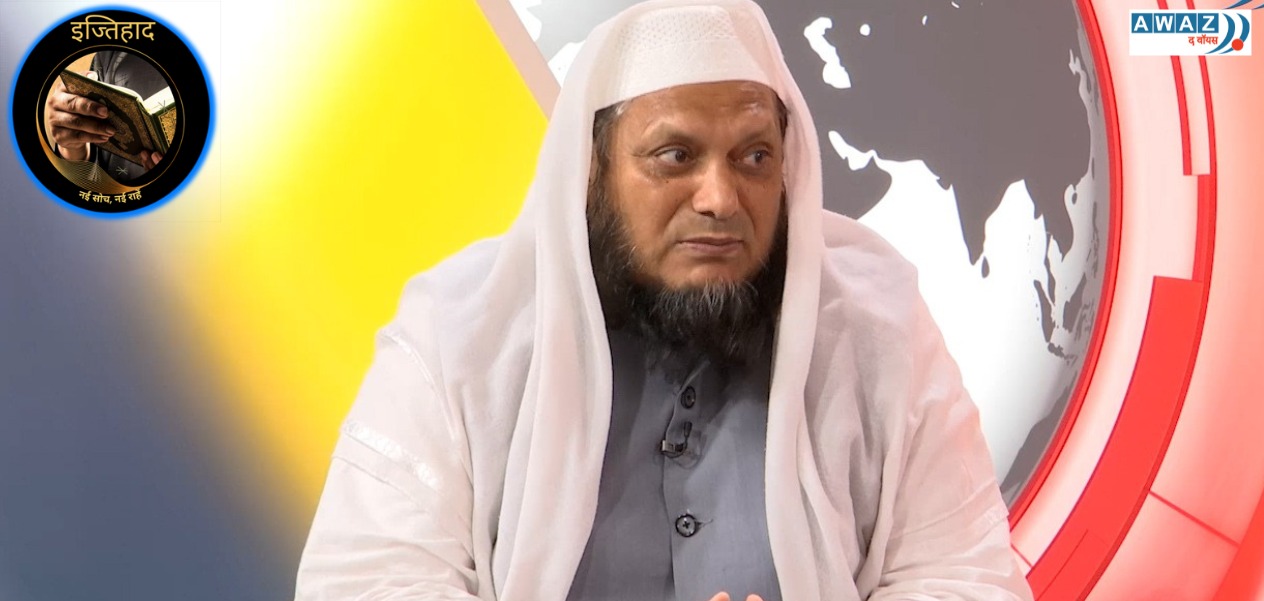
India is home to many cultures of the world and Muslim are the second largest religious community. However, the Muslims need to get major issues that come up in the changing times before them to be interpreted in the light of the Quranic teachings, Shariah and Sunnat, through Ijtihad. Abdul Hai Khan, of Awaz-The Voice, Urdu spoke with Mufti Ahmed Nadir Qasmi of Delhi's Islamic Fiqh Academy about how can Indian Muslims approach the authorities for Injihad. Excerpts from the conversation:
Q: In Islamic countries, Muslims can resolve the issues that arise from time to time due to the presence of Islamic authority. However, this system cannot work in India, Also, we have noticed that even in Islamic countries there is a difference in the laws concerning Muslims Like for example in Egypt, a Muslim can have only one wife while it is not so in other Muslim countries. Also for blasphemy, there are different laws ranging from a death sentence to prison terms ranging from two years to ten years. Also, there is no debate on this in the Islamic world and then how can the Islamic law gain credibility?
Look, if an (Islamic) country makes a law that is against Quran and Hadith, this kind of Islam is not ideal for others. Since it is certain that for Muslims, the holy Qur'an and Prophet’s sayings on it are the principles of life. If any country makes a law contrary to this then it is not acceptable to the Muslims. The Muslims must oppose that law. Such a law even if made in Saudi Arabia cannot be called Islamic law and it will not be acceptable. Islam is static and unchanged; Islam is all that is in the Quran and Sunnah (deeds of Prophet Muhammad)
Q: Suppose Muslims agree on some contentious issues then how will the law or the ruling bee implemented?
The way the law is made in the Parliament and is also explained there and it’s implemented through the courts in the same way, the order to make Fiqh mandatory is the responsibility of the Muslim authority in an Islamic setup. However, the bigger authority is Muslims’ attitudes and beliefs. The biggest authority that can enforceHukm-e-Sharia, is the firm intention and belief of a human being in Islam.
Ulema and institutions like Darul Qaza, and Fatwa Department, only spell the order of Shariat. But it’s only the faith of Muslim society that can see this is followed. For example, if there is an order in the Quran that the death of a person who leaves behind two sons and a daughter, the property cannot be divided arbitrarily. The Son might say that he will take all the property or maybe the daughters will also say the same. However, the right way is to divide it along what has been said about it in Quran.
No court can impose the Quranic order on this. No Darul Ifta will say that you should impose it on yourself. He will only tell that it is the order of Shariat that if someone's father dies, the property left by him should be distributed among his heir according to Shariah.
The order has been made clear, now it is one's honest feeling to disobey it. The biggest feature is that no organization imposes Islamic law on Muslim society, but it is the honest spirit itself.
Q: Many people believe in Ijtihad and others don’t. People sometimes don’t know which is the authority they can approach for Ijtihad. They speak to some random person and if his suggestion suits them take it. Who are the authorized persons for Ijtihad?
See, Mastahid has knowledge of the Quran and has understood it thoroughly; he should know all about the life and teachings of our Prophet. The person should be conversant in the Arabic language and manners and should know the principles of Tafseer, Nasikh, and Mansukh. He should be aware of the ijma and the position the ummah has taken on all the issues including one he is supposed to deal with. He should be able to know the nuances of Islamic jurisprudence.
Only someone who has all these traits and has studied to the level of becoming an expert can decide on matters in the light of Quran and Hadith, and give an order.
This is ijtihad and the person who decides on issues in the abovementioned backdrop is called a mujtahid. Ijtihad can be done by a good and capable Mufti. He should be able to explain the ruling on the matter with a lot of attention and concern. Many Muftis can also do it jointly, we have examples of this.
Institutions like Darul Ifta are present in every city. Besides there are institutions of Nadwa, Mubarakpur, Deoband, and Delhi and the people there are aware of their role
These institutions have good Muftis who have sound knowledge of relevant things. Anyone can meet them and ask them about any issues. One should not go to unknown places.
Q: There seems to be no consensus on major issues like Jabiha (slaughtering an animal), Azaan, and many such topics. Why it is so?
The issue of Jabiha does not come under the purview of Ijtihad. It is related to the needs of the man himself, the society, and the practice of religion. Article 90 of the Indian constitution gives everyone the right to follow his religion. The issue of loudspeakers also does not come under the purview of ijtihad. Since Shariat has not said that loudspeakers be used for azan. Shariat has only ordered Azaan. Since the population has increased there was a need for Mike so that Azan reaches to everyone and far and wide, so that people can come for Namaz.
